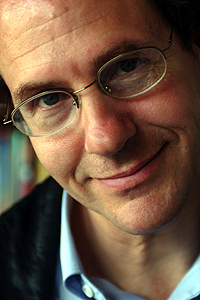![[Chronicle]](/images/sidebar_header_oct06.gif)
Vol. 26 No. 2
current issue
archive / search
contact
Past Opine interviews:
Lauren Berlant
Stephen Berry
John Boyer
David Cohen
Jerry Coyne
John Cunningham
Richard Epstein
John Frederick
Henry Frisch
Austan Goolsbee
Bernard Harcourt
Greg Jackson
Martin Marty
Martha Nussbaum
Raymond Pierrehumbert
José Quintáns
Jan-Marino Ramirez
Saskia Sassen
William Sewell
Herman Sinaiko
Geoffrey Stone
Cass Sunstein
Simon Swordy
Opine: Cass Sunstein
 Cass Sunstein | |
In this issue, The University of Chicago Chronicle staff introduces a new feature-profile in a format that diverges slightly from the paper’s usual reporting. Scholars on the University’s faculty and their students steadfastly pursue their research to further knowledge, and the Chronicle regularly reports the results of their inquiries. But to tap into more of the University’s intellectual capital we will be asking members of the University community to offer opinions and a sampling of their personal preferences. Welcome to Opine.
Cass Sunstein, the Karl N. Llewellyn Distinguished Service Professor of Jurisprudence in the Law School, is of the opinion . . .
What book would you recommend every person read and why?
John Rawls’ A Theory of Justice because it has so many important ideas about justice, and about how to think about it.
Who—dead or alive—is your favorite scholar, author, composer, musician and entrepreneur?
Favorite scholar: Daniel Kahneman at Princeton University. To simplify life, I’m restricting myself throughout to the living and exempting University of Chicago people.
Author: A.S. Byatt on the strength of her novel Possession: A Romance
Composer: Bob Dylan
Musician: Bob Dylan
Entrepreneur: Larry Page and Sergey Brin, founders of Google. I spoke at Google recently, and it is an amazing and public-spirited place.
Of these people, who is the one person you’d prefer to meet and converse with?
Bob Dylan
If you consider some of the complex moral and political issues that affect humanity, which issue/problem do you believe will never be resolved and why?
Animal welfare and animal rights. The reason is that human beings have such a stake in unjustifiable and cruel practices. But things will get a lot better.
If politicians had to pass an exam before they were allowed to serve in a public office, what question would you add to the test?
Analyze the problem of climate change. Reason: There are unhelpful clichés on both sides, and this question could test both for intelligence and for problem- solving capacities.
If you could choose any three University professors and give them a one-year sabbatical together to solve a problem, develop a theory or make a discovery, who would you choose and what task would you assign them to work on?
The problem of catastrophic risk. Richard Thaler, Eric Posner and Martha Nussbaum.
The University has many traditions, some academic, such as the Humanities Open House and the Aims of Education Address, and some more recreational, such as the Latke Hammentash debate and the annual student Scavenger Hunt. If you were asked to create a new University tradition, what would it be?
Bring Your Dog To Work Day!
Think of a renowned scholar from the past, now dead, who added great value to your area of study. Who is this person, and what do you believe this person would think of the advances that recently have been made in this area?
Lon Fuller, a renowned law professor, who would be astounded, and impressed, by the rise of economic analysis of law—and also astounded, and probably more impressed, by the rise of behavioral economics, which questions so much of standard economic analysis.